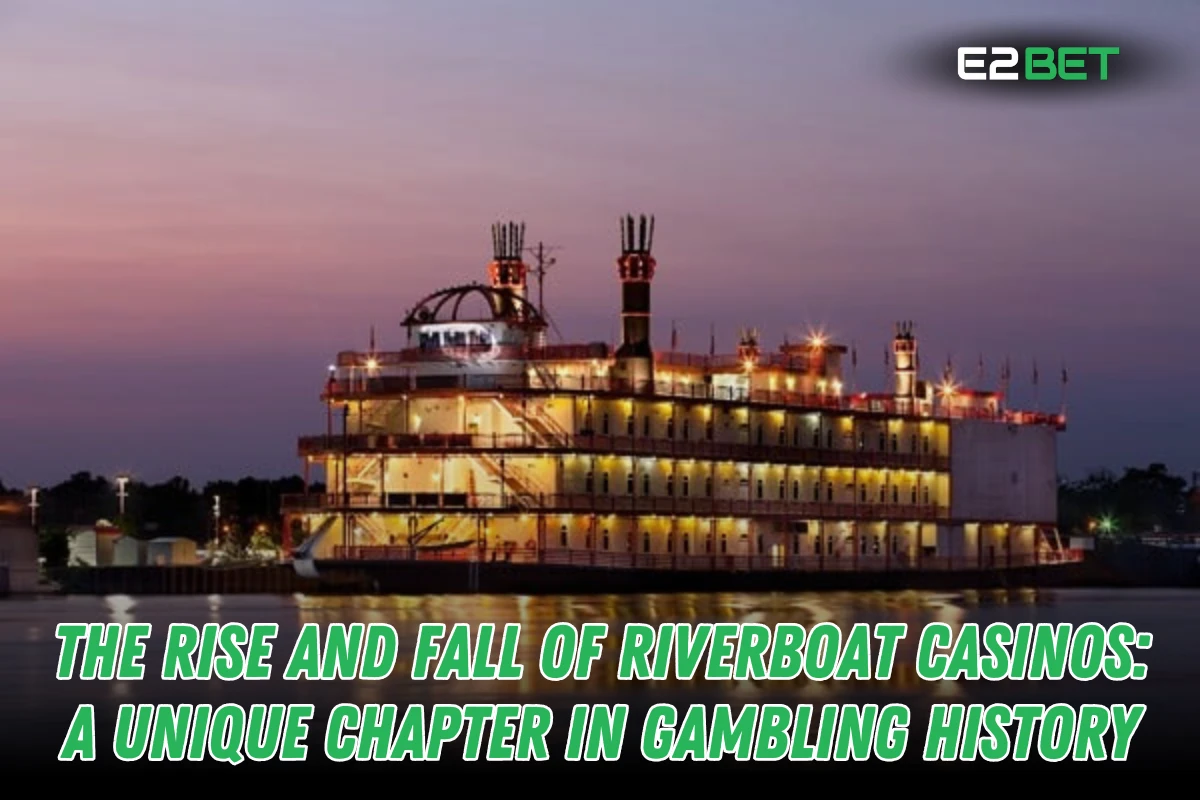Riverboat Casinos History, For decades, riverboat casinos were a major attraction in American gambling culture, offering a unique blend of history, entertainment, and scenic views. These floating casinos in the U.S. gained popularity as a legal loophole for gambling in states where land-based casinos were prohibited.
However, the era of Mississippi River casinos and other floating gambling establishments began to fade as land-based casinos and online gambling took over. This article explores the history of riverboat casinos, their rise, decline, and lasting impact on the casino industry trends.
The Origins of Riverboat Gambling
Early Gambling on the Mississippi River
Before the bright lights of Las Vegas, gambling thrived on Mississippi River casinos, where travelers engaged in card games, dice, and wagering during long voyages. In the 19th century, gambling history in America was shaped by professional gamblers known as “riverboat sharps”, who earned fortunes on these floating establishments.
The First Legal Riverboat Casinos
The legalization of riverboat gambling laws began in the early 1990s, with states like Iowa, Illinois, Louisiana, and Mississippi leading the way. To comply with regulations, these casinos initially had to set sail at regular intervals before gambling could begin.
As demand grew, lawmakers adjusted casino legalization timelines, allowing riverboat casinos to remain docked permanently, making them more accessible to players.

The Golden Age of Riverboat Casinos
Popular Riverboat Casino Destinations
During their peak, riverboat casino locations included:
- Mississippi – Home to major casino hubs like Tunica and Biloxi
- Illinois & Indiana – Featuring riverboat casinos in Chicago and Evansville
- Iowa & Missouri – Known for floating casino regulations
- Louisiana – Famous for New Orleans riverboat casino tours
How Riverboat Casinos Operated
Operating under unique gambling laws, these casinos offered classic games like:
- Blackjack, poker, and roulette
- Slot machines and high-stakes betting
- Luxury dining and VIP programs
For many tourists, booking a riverboat casino tour became a must-have experience, blending gambling history in the 19th century with modern gaming.
Economic Boom and Job Creation
The rise of casino tourism impact was undeniable. Towns near floating casinos in the U.S. experienced economic growth, with hotels, restaurants, and local businesses thriving due to the influx of visitors.
Many riverboat casinos introduced VIP membership programs, riverboat casino deals, and loyalty programs, attracting both casual players and high rollers.
The Decline of Riverboat Casinos
Changes in Gambling Laws
As the demand for casinos grew, many states revised riverboat gambling laws, allowing land-based casinos to operate legally. This led to a decline in the need for floating casinos, as visitors preferred the convenience of luxury resorts and gaming hotels.
Competition from Land-Based Casinos and Online Gambling
The expansion of Las Vegas-style casinos and the rise of online gambling and mobile betting significantly impacted Mississippi Riverboat casinos and other floating gambling establishments.
Players now had access to the best poker tournaments on riverboats or could simply play from home using mobile betting platforms.
The Impact of Economic Downturns
Many casino bankruptcies and closures occurred due to economic recessions. Some casinos struggled to maintain profitability, leading to the decline of best riverboat casino experiences.
Riverboat Casinos Today: A Nostalgic Legacy
Existing Riverboat Casinos
Though most Mississippi River casinos have shut down, a few still operate, mainly in Illinois, Louisiana, and Missouri. Some casinos have transitioned into riverboat casino hotel packages, offering nostalgic experiences for visitors.
Cultural and Historical Significance
The casino industry trends continue to evolve, but riverboat gambling history remains an iconic part of American culture. Many books, films, and documentaries explore the history of gambling on riverboats, preserving the legacy of these floating casinos.
Conclusion
The rise and fall of riverboat casinos tell a compelling story of innovation, adaptation, and eventual decline. Once a creative way to bypass gambling restrictions, these floating casinos in the U.S. struggled to compete with the best land-based casinos and online platforms.
Despite their decline, the nostalgic charm of riverboat casinos remains, and who knows? Maybe one day, casino tourism impact will bring these historic gambling venues back to life.
FAQs
Q1. What were riverboat casinos, and why were they built on water?
Ans: Riverboat casinos were floating gambling establishments that operated on rivers to comply with gambling regulations.
Q2. Which states had the most famous riverboat casinos?
Ans: Mississippi, Louisiana, Illinois, Iowa, and Indiana were among the most popular riverboat casino locations.
Q3. Why did riverboat casinos start to decline?
Ans: The legalization of land-based casinos and online gambling platforms led to the downfall of riverboat gambling.
Q4. Are there still any operating riverboat casinos today?
Ans: Yes, but only a few remain, mainly as historical attractions or tourist destinations.
Q5. Could riverboat casinos make a comeback in the future?
Ans: Possibly, if marketed as a luxury or themed experience, similar to floating casino destinations.